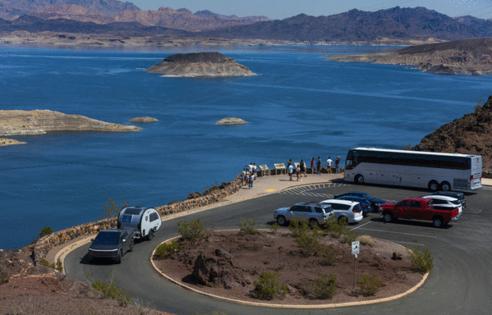What's the latest on the Colorado River negotiations?
Published in Science & Technology News
The U.S. Bureau of Reclamation released a breakdown Wednesday of five potential paths forward for the fragile state-to-state negotiations surrounding Colorado River operating guidelines that must be updated by 2026.
The Colorado River, which is Southern Nevada’s primary source of water, holds a precarious future as the basin experiences historic drought and state leaders disagree on how to deal with shortages. The range of alternatives is possibly the last major announcement about negotiations to come from the Bureau of Reclamation under the Biden-Harris administration.
“We have worked tirelessly over the past several years to bring Colorado River Basin stakeholders together for a transparent and inclusive post-2026 process,” Reclamation Commissioner Camille Calimlim Touton said in a statement. “Today, we show our collective work. These alternatives represent a responsible range from which to build the best and most robust path forward for the Basin.”
What to know heading into 2025
The breakdown between two coalitions of states, the Upper and Lower Basins, centers around whether the Upper Basin — Colorado, Utah, New Mexico and Wyoming — should be required to take cuts to its water allocation past what’s known as the river’s “structural deficit,” or the 1.5 million acre-feet lost to evaporation and transport. The Upper Basin has argued that it takes too many cuts already because of its reliance on snowpack instead of big reservoirs.
The Lower Basin also has called for smaller reservoirs in the Upper Basin states to be included in discussions about cuts in water usage across the system.
Notably, one of the five alternatives is based on proposals from Native American tribes, calling for the government to account for undeveloped tribal water.
The acknowledgement of the ongoing duel between the Upper and Lower Basins is the “Basin Hybrid” alternative, which appears to fall somewhere down the middle of the two coalition’s proposals.
In a statement, Upper Basin Commissioner and Colorado negotiator Becky Mitchell said it’s too early to speak directly about the five alternatives from the Bureau of Reclamation.
“Colorado continues to stand firmly behind the Upper Division States’ Alternative, which performs best according to Reclamation’s own modeling and directly meets the purpose and need of this federal action,” she said.
The Lower Basin states of Nevada, California and Arizona didn’t immediately release a statement when the announcement was released at 1 p.m.
All seven state negotiators will convene in Las Vegas in early December at the Colorado River Water Users Association conference, where experts and officials will discuss what’s to come from negotiations under President-elect Donald Trump.
___
©2024 Las Vegas Review-Journal. Visit reviewjournal.com.. Distributed by Tribune Content Agency, LLC.







Comments